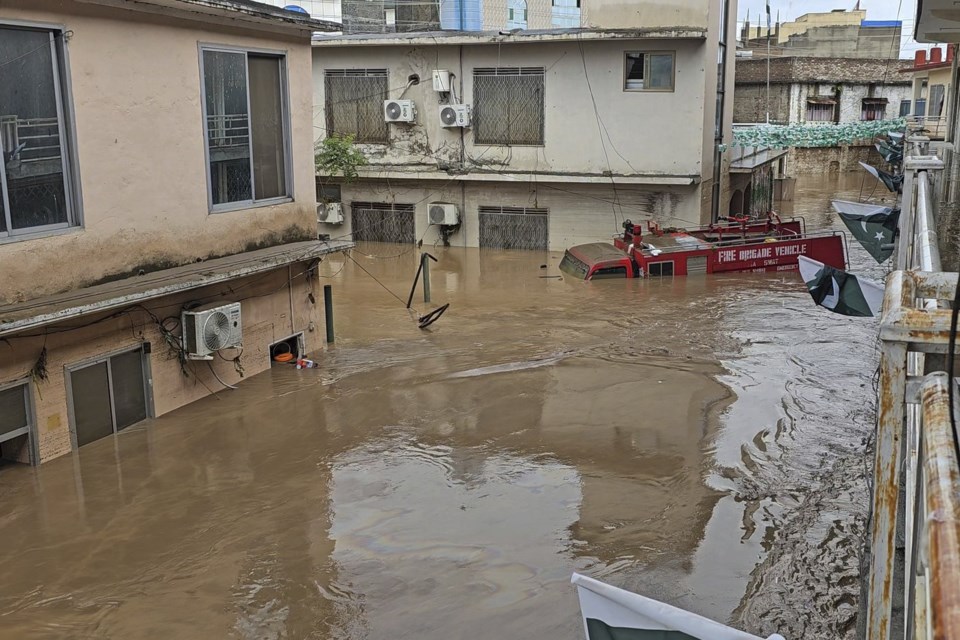BUNER, Pakistan (AP) — Rescuers in northwest Pakistan pulled 63 more bodies overnight from homes flattened by flash floods and landslides, raising the death toll from rain-related incidents to at least 220, officials said Saturday.
Pakistan has received above-normal rains, which experts link to climate change, leading to floods and mudslides that, with the newly reported fatalities, have killed about 541 people since June 26, according to the National Disaster Management Authority.
Hundreds of rescue workers are still searching for survivors in Buner, one of several districts hit in the province of Khyber Pakhtunkhwa, where torrential rains and cloudbursts triggered massive flooding on Friday, said Mohammad Suhail, a spokesman for the emergency services. Dozens of homes were swept away.
First responders have been trying to recover bodies in the worst-hit villages of Pir Baba and Malik Pura, where most people died on Friday, according to Kashif Qayyum, a deputy commissioner in Buner.
A local police officer, Imtiaz Khan, who narrowly escaped the deluges, said floodwaters carrying hundreds of boulders struck and flattened dozens of homes within minutes in Buner.
“A stream near the Pir Baba village in Buner swelled without warning. At first, we thought it was a normal flash flood, but when tons of rocks came crashing down with the water, 60 to 70 houses were swept away in moments,” Khan told The Associated Press, adding that many bodies were left mutilated.
“Our police station was washed away too, and if we hadn’t climbed to higher ground, we would not have survived,” he said.
Rescuers said as water started to recede, they saw large swathes of the village destroyed, wrecked homes and giant rocks filling the streets
“It was not just the floodwater, it was a flood of boulders as well, which we saw the first time in our lives," said Sultan Syed, 45, who suffered a broken arm.
Mohammad Khan, 53, said the floods "came so fast that many could not leave their homes,” he said.
Most of the victims died before reaching the hospital, said Mohammad Tariq, a medical doctor at a government hospital in Buner. “Many among the dead were children and men, while women were away in the hills collecting firewood and grazing cattle,” he said.
Mourners attended mass funerals on Saturday as authorities supplied tents and food items to the flood-affected people in Buner.
According to the provincial disaster management authority, at least 351 people have died in rain-related incidents this week across Khyber Pakhtunkhwa and the northern region of Gilgit-Baltistan.
Nearly 300 kilometers (about 186 miles) away in Indian-controlled Kashmir, rescuers scoured the remote village of Chositi in the district of Kishtwar on Saturday, looking for dozens of missing people after it was hit by flash floods two days ago, killing 60 and injuring some 150, about 50 in critical conditions. Thursday's floods struck during an annual Hindu pilgrimage in the area. Authorities have rescued over 300 people while some 4,00 pilgrims have been evacuated to safety.
Such cloudbursts are increasingly common in India’s Himalayan regions and Pakistan’s northern areas, and experts have said climate change is a contributing factor.
Pakistani officials said rescuers since Thursday have evacuated more than 3,500 tourists trapped in flood-hit areas across the country.
Many tourists have ignored government warnings that urged people to avoid flood-hit regions in the northern and northwestern regions, fearing more landslides and flash floods.
In 2022, Pakistan witnessed the worst monsoon season that killed more than 1,700 people and caused an estimated $40 billion in damage.
___
Khan reported from Peshawar, Pakistan. Associated Press writers Rasool Dawar in Peshawar, Pakistan, Ishfaq Husain in Muzaffarabad, Pakistan, and Channi Ananad in Chositi, India contributed to this report.
Muhammad Sajjad And Riaz Khan, The Associated Press



